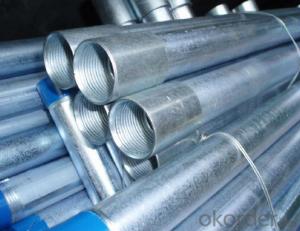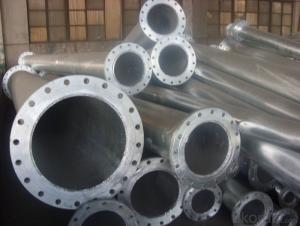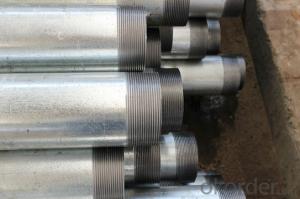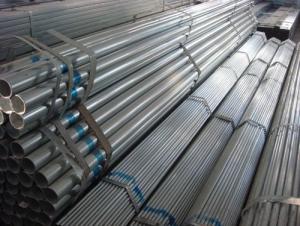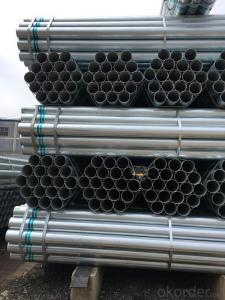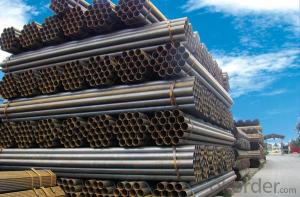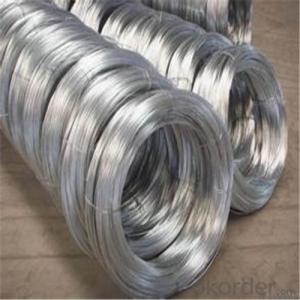hot dipped galvanized pipe with thread and coupling
- Loading Port:
- China Main Port
- Payment Terms:
- TT OR LC
- Min Order Qty:
- -
- Supply Capability:
- -
OKorder Service Pledge
OKorder Financial Service
You Might Also Like
O.D | O.D tolerance | W.T | Thickness Tolerance |
1/2-12'' | ±0.3mm | 1.5-12 MM | ±8% |
Length | 3m,4m,5.8m,6m or according customers' requirements | ||
Certificate | ISO9001-2008,EN10210,API,Raw material cert,Mill cert,Reap on site inspection report,SGS,BV | ||
Standard | ASTM A53/ASTM A36 BS1387/BS1139/EN39/EN10219/EN10217/EN10297/EN10296/EN10025 etc | ||
Material | Q195/215/235/345, SS330/400/500, S235JR/S235JQ/S235J2, etc | ||
Inspection | With Hydraulic Testing, Eddy Current , Infrared Test, etc | ||
Technique: | Welded Hot rolled,heat extrusion | ||
Packing | in bundle or in bulk, PVC in blue or in strip | ||
Usage | For construction, Pluid and Greenhouse | ||
Main market: | Middle east,North and South America, East and West Europe, South and southeast Asia,Australia,Africa, | ||
Place of Origin | China | ||
HS code: | 73063090 | ||
Productivity | 2000Ton/Month | ||
Processing | galvanzied,inner and outer stab clean,bevelled oiled,painted black threading,with coupling and plastic caps protected packing in plastic cloths,3PE,FBE,corrosion resistant coating | ||
- Q: Are steel pipes suitable for structural purposes?
- Yes, steel pipes are suitable for structural purposes. They are known for their high strength, durability, and resistance to various environmental conditions, making them ideal for use in constructing buildings, bridges, and other infrastructure projects. Additionally, steel pipes are versatile and can be easily modified and connected to meet specific structural requirements.
- Q: Can steel pipes be coated for additional protection?
- Yes, steel pipes can be coated for additional protection. Coatings such as epoxy, polyethylene, or zinc can be applied to steel pipes to enhance their durability, corrosion resistance, and longevity.
- Q: What are the different methods of pipe threading for steel pipes?
- There are several methods of pipe threading for steel pipes, including manual threading, machine threading, and roll grooving. Manual threading involves using a hand-held die and a pipe vise to create threads on the pipe. Machine threading uses power-driven threading machines that can quickly and accurately create threads on steel pipes. Roll grooving, on the other hand, involves using a specialized machine that forms a groove on the pipe, eliminating the need for threading and allowing for easy installation of pipe couplings or fittings. Each method has its advantages and is chosen based on factors such as pipe size, project requirements, and efficiency.
- Q: What are the different grades of steel pipes?
- The different grades of steel pipes vary based on their chemical composition and physical properties. Some commonly used grades include carbon steel pipes (grades A, B, and C), alloy steel pipes (grades P1, P5, P9, and P11), stainless steel pipes (grades 304, 316, and 321), and duplex steel pipes (grades 2205 and 2507). Each grade offers specific characteristics suited for different applications and industries.
- Q: How are steel pipes used in the manufacturing of sewage treatment plants?
- Steel pipes are commonly used in the manufacturing of sewage treatment plants primarily for their durability, strength, and resistance to corrosion. These pipes are utilized for various purposes within the treatment process, including transporting sewage and wastewater between different treatment units, carrying chemicals for disinfection or neutralization, and providing structural support for the plant's infrastructure.
- Q: How are steel pipes used in the manufacturing of furniture and appliances?
- Due to their strength, durability, and versatility, steel pipes find widespread use in the production of furniture and appliances. In furniture manufacturing, they are commonly employed to construct the frames and structures of various pieces, including chairs, tables, and beds. Serving as the primary support system, these pipes ensure a sturdy and dependable foundation for the furniture. In appliances, steel pipes serve multiple purposes. They are frequently utilized to create the internal framework and bear the weight of kitchen appliances such as stoves, ovens, and refrigerators. Additionally, steel pipes are commonly found in washing machines, dryers, and dishwashers, facilitating the transportation of water and other fluids throughout the appliance. Moreover, steel pipes are essential in the manufacture of outdoor furniture and equipment that require weather resistance and durability. To safeguard against rust and corrosion, these pipes are often coated with protective materials, thus ensuring the longevity of the furniture and appliances. In conclusion, steel pipes play a vital role in the production of furniture and appliances, providing the necessary strength and support. Their versatility allows for various applications, making them an indispensable component in the manufacturing process of these goods.
- Q: What is the difference between steel pipes and cast iron pipes?
- The main difference between steel pipes and cast iron pipes lies in their composition and properties. Steel pipes are made from an alloy of iron and carbon, which gives them high strength and durability. They are also resistant to corrosion and can withstand high pressure and temperature conditions. On the other hand, cast iron pipes are made from molten iron, which provides them with excellent soundproofing capabilities and resistance to fire. However, cast iron pipes are more prone to corrosion and can be brittle, making them less suitable for high-pressure applications.
- Q: What are the typical lengths of steel pipes?
- The typical lengths of steel pipes vary depending on the industry and application. However, common lengths for steel pipes range from 18 to 40 feet.
- Q: Water, gas, steel pipes, thick steel wire means?
- Often used in water, heating, gas, compressed air and vacuum lines. Can be used in pressure gauge pressure of 0.6 MPa (6 atm) steam pipe and condensate pipeline below, can also be used for conveying non erosive and non flammable and explosive media. Is divided into ordinary (working pressure is 1 MPa pressure gauge, 10) and strengthening (working pressure gauge is 1.6 MPa, 16 ATM) two. Galvanized white iron tube (galvanized iron tube). Non galvanized black iron pipe (black pipe).
- Q: Can steel pipes be used for geothermal systems?
- Yes, steel pipes can be used for geothermal systems. Steel pipes are commonly used in geothermal systems for their high strength, durability, and ability to withstand high temperatures and pressures. They are also resistant to corrosion, making them suitable for long-term use in geothermal applications.
Send your message to us
hot dipped galvanized pipe with thread and coupling
- Loading Port:
- China Main Port
- Payment Terms:
- TT OR LC
- Min Order Qty:
- -
- Supply Capability:
- -
OKorder Service Pledge
OKorder Financial Service
Similar products
Hot products
Hot Searches
Related keywords
